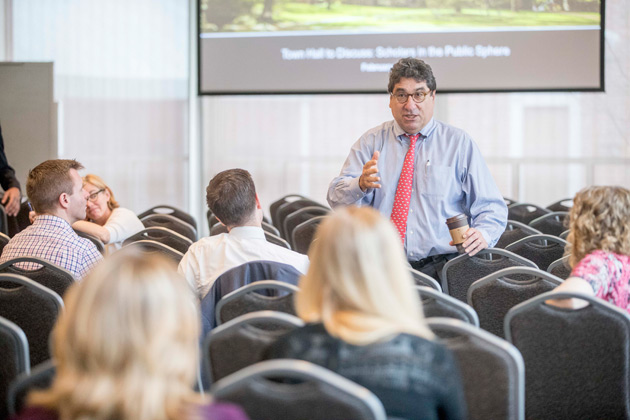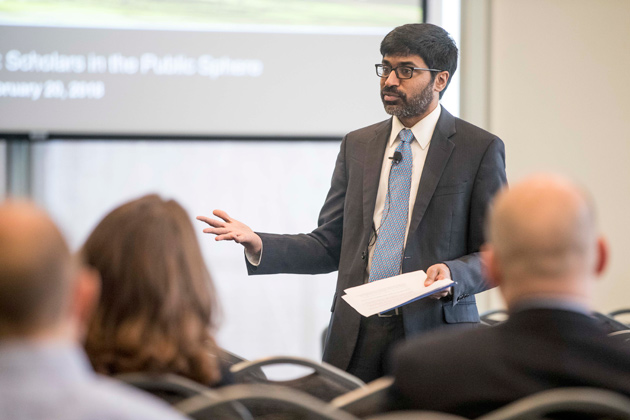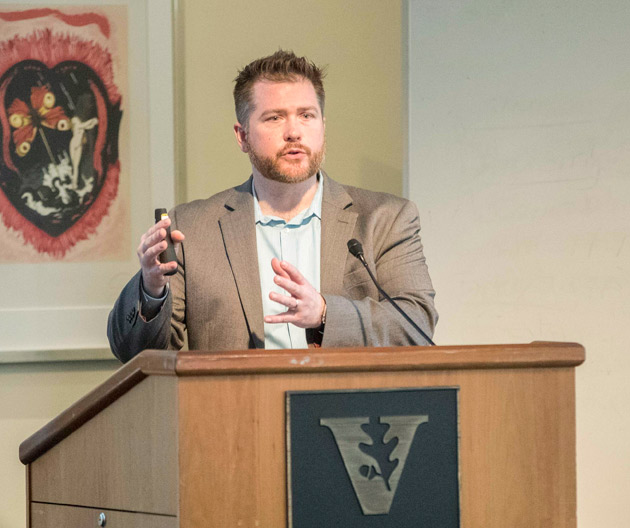This regular column is aimed at opening another channel of conversation with you about the opportunities and challenges we face, together as the faculty, students, staff and leaders of our great university.

Last summer while on vacation with my family in Wyoming, I went to the local bookstore as I always do when traveling. Valley Bookstore in Jackson Hole is a self-declared “mom and pop.” The space is modest, but the shelves are filled with a carefully curated collection of history, ecology, fiction, children’s books and more. In every bookstore I visit, I scan the shelves for Vanderbilt faculty authors. On that day I was delighted to find the latest books from Professor of Law Ganesh Sitaraman and Professor of Law and History Daniel Sharfstein.
Both works have been acclaimed on every platform, traditional and digital, since their publication for their insights into democracy, society and humanity. Yet for all of the accolades, I think I may have been most moved to find them on those crowded shelves in a corner of America’s remaining wilderness, waiting for the next reader.
This Tuesday I had the chance to engage in a vigorous discussion with faculty led by Ganesh and Vice Chancellor for Communications Steve Ertel about our role and responsibility as educators and researchers to bring our scholarship, insights and knowledge into the public discourse.
The discussion is part of our new initiative “Enhancing Faculty Voices in the Public Sphere.” A committee, appointed by Provost Wente and chaired by Ganesh with liaisons in every school, is charged with recommending a deliberate set of programs and resources to help faculty position their work to best inform complex public discussions about how we govern, how we relate to one another, how we educate, how we fight disease and disorder, and how we understand and shape our ever-changing world.

As scholars and researchers, I believe we all are concerned with impact. We conduct research because it fascinates us, it drives us, and ultimately, because we want to make a difference. Our faculty advance critical conversations every single day—through talks at conferences, papers in peer-reviewed journals, op-eds, media interviews and always, always through their teaching. Every day, our faculty take the work they have devoted their lives to and find ways to connect it to the larger discussions in their fields.
Our aim with this new initiative is to make those connections more deliberate, more effective and more impactful. Faculty—with the great involvement of undergraduate, graduate and postdoctoral scholars and dedicated staff—are doing the difficult work of discovery. It is our role as leaders to ensure the work of communication and elevation is just as rigorous. We created the Division of Communications under Steve’s leadership nearly a year ago to spearhead this work. On Tuesday we heard great interest in increased resources for data visualization and other graphics, traditional media connections, op-ed writing, social media engagement, video and more. The committee will take this feedback, and additional feedback they hear from you, to recommend programs, training and support.

And now is the time to make this investment. Now more than ever, we are experiencing a thirst for reliable information from trusted intermediaries conducting rigorous new and emerging scholarly work. We receive more and more interest in our research to untangle and understand the forces at play in our world. I firmly believe that now is a critical time in our nation’s history for Vanderbilt and the American university overall to make broader claims about our importance in the public sphere.
There are powerful narratives attempting to marginalize our contributions, to peg us as privileged, cloistered and out of touch. It is up to us to push back against those narratives. We contribute enormously to the welfare and advancement of our society, and it is our duty and responsibility to communicate those contributions forcefully, effectively and constantly.
I encourage you to submit your ideas and suggestions for a program of resources, training and networking that supports the engagement of our community with the public through research and scholarship on the challenges and opportunities we face as a society. I look forward to advancing our story, together.
“What’s On My Mind” is a regular column from Vanderbilt University Chancellor Nicholas S. Zeppos on the life, people and mission of Vanderbilt University and issues affecting higher education today. Share your thoughts at chancellor@vanderbilt.edu.